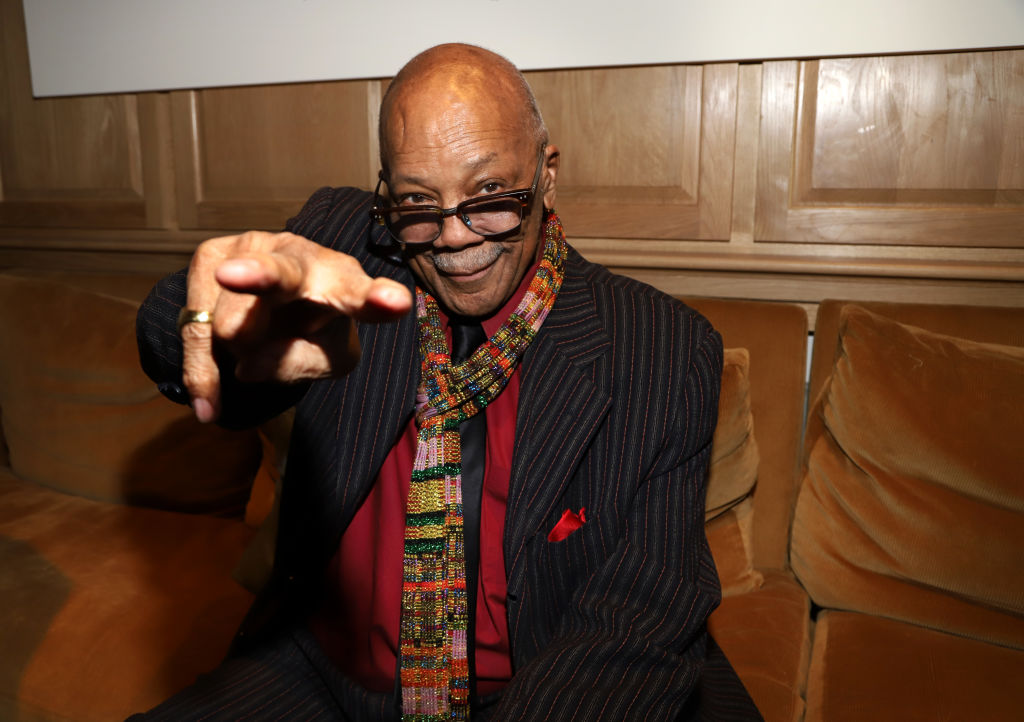Quincy Jones will forever be etched in history.
It was announced on Nov. 3, 2024, that the famed producer, born Quincy Delight Jones Jr. in Chicago, IL, passed away at the age of 91 in his Bel Air home in Los Angeles, CA.
“Tonight, with full but broken hearts, we must share the news of our father and brother Quincy Jones’ passing. And although this is an incredible loss for our family, we celebrate the great life that he lived and know there will never be another like him,” Jones’ family said in a statement, according to US Weekly.
Fortune And Legacy
He is survived by seven children and leaves behind a legacy that led to a reported $500 million fortune, as AFROTECH™ previously told you. Jones is a decorated figure within the music and entertainment industry, with accolades that include 28 Grammy awards and a number of legendary works, including composing “The Wiz” and serving as executive producer of “The Fresh Prince of Bel-Air,” which starred Will Smith.
Reflecting on the loss, Smith took to Instagram and wrote, “Quincy Jones is the true definition of a Mentor, a Father and a Friend. He pointed me toward the greatest parts of myself. He defended me. He nurtured me. He encouraged me. He inspired me. He checked me when he needed to. He let me use his wings until mine were strong enough to fly.”
Jones, who found his passion for music in Bremerton, WA, after stumbling upon a piano inside a community center, mentions Reuters, has lived many lives. When he was 14 years old, he received mentorship from Ray Charles, who was 16 at the time, and they both worked under local bandleader Bumps Blackwell, per The New York Times.
While still in his teens, Jones would begin to take his talents on the road.
“Music was the one thing I could control,” Jones said in his autobiography, according to Reuters. “It was the one world that offered me freedom … I didn’t have to search for answers. The answers lay no further than the bell of my trumpet and my scrawled, penciled scores. Music made me full, strong, popular, self-reliant and cool.”
By the 1950s, Jones was touring across the world. He released his first album, “This Is How I Feel About Jazz” in 1956, The New York Times reports. In the 1960s, he made history as one of the few Black executives working at a white record label when signing on with Mercury Records.
Jones’ career trajectory would lead him to broaden his musical footprint beyond jazz.
“The underlying motivation for any artist, be it Stravinsky or Miles Davis, is to make the kind of music they want and still have everyone buy it,” he noted to Rolling Stone, according to a report from Reuters.
His philosophy would lead to one of music’s greatest masterpieces through his work with Michael Jackson, whom he first met when The Jackson 5 singer was 12, and later they reunited on the set of “The Wiz.”
“We didn’t meet again until years later when we worked on The Wiz, but I knew then that he had the potential to go way beyond what he’d previously done,” Jones wrote in a 2017 Facebook post.
Jackson played the role of Scarecrow while Jones served as the film’s musical supervisor and producer, with pieces that include “You Can’t Win,” “Believe in Yourself,” and “Ease On Down the Road.”
It was while on set that Jackson tossed out an idea for his solo album to Jones as he was seeking his help in finding a producer. Jones would later suggest himself, although the producer said the idea was initially shot down by Epic Records, Jackson’s label at the time, according to a resurfaced interview with Entertainment Tonight.
The pair proceeded anyway, leading to a three-album collaboration, which kicked off with “Off The Wall” (1979), followed by “Thriller” (1982) and “Bad” (1987).
To this day, “Thriller” remains the best-selling album of all time and earned eight Grammys in 1984, per The New York Times.
Jones has worked with countless other artists such as Frank Sinatra, Aretha Franklin, James Brown, Stevie Wonder, Tina Turner, and Usher. Beyond “The Wiz,” his works have also scored placements in nearly 40 films, which include “In the Heat of the Night,” “In Cold Blood,” “Mackenna’s Gold,” and “The Color Purple.”
Jones is also recognized for founding Hip-Hop magazine Vibe in 1992 and Qwest TV, a streaming platform for jazz artists, which launched in 2017.
Truly one of the best to ever do it. Rest in peace, Quincy Jones.

















